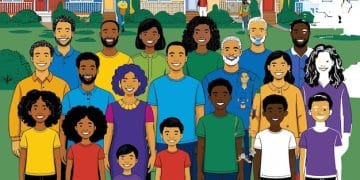Evolving US Family Structure: Impact on Societal Values in 2025

By 2025, the evolving US family structure, marked by increased single-parent households, same-sex partnerships, and blended families, is significantly reshaping societal values, influencing norms around parenting, marriage, and community support systems, and prompting a reevaluation of traditional expectations and social policies.
The American family is undergoing a significant transformation. As we approach 2025, understanding how the evolving US family structure is impacting societal values becomes crucial for navigating the changing cultural landscape.
The Shifting Sands of American Family Structures
The traditional image of a nuclear family, consisting of a married couple with children, is no longer the dominant model in the United States. Several factors contribute to this shift, including changing social attitudes, economic pressures, and advancements in reproductive technology. These changes are rippling through society, impacting everything from education to healthcare.
Rise of Single-Parent Households
One of the most significant trends is the increase in single-parent households, often headed by women. This shift has implications for economic stability, childcare arrangements, and the overall well-being of children.
Growing Acceptance of Same-Sex Partnerships
The legalization of same-sex marriage and increasing social acceptance of LGBTQ+ individuals have led to more same-sex couples forming families. This challenges traditional notions of marriage and parenting.
- Impact on legal definitions of family.
- Changing societal perceptions of parenting roles.
- The need for inclusive policies in schools and workplaces.
In conclusion, the evolving structure of American families is rewriting the rules of engagement in many societal domains, placing new expectations on established institutions and challenging long-held cultural assumptions.
Economic Factors Shaping Family Dynamics
Economic pressures play a significant role in shaping family structures and values. The rising cost of living, coupled with stagnant wages, forces many families to make difficult choices about work, childcare, and education. These economic realities influence family size, living arrangements, and the roles of individual family members.

Dual-Income Households
To cope with economic challenges, a majority of families now rely on two incomes. This shift affects traditional gender roles and places additional demands on parents’ time and energy.
Impact of Economic Inequality
The growing gap between the rich and the poor exacerbates economic pressures on low-income families, leading to increased stress and instability.
Economic factors are inextricably linked to the value systems upheld and practiced within families. The struggle to make ends meet can strain relationships, while financial stability often allows for more attention to be paid to personal growth and societal engagement.
Technological Influences on Family Life
Technology has become an integral part of modern family life, shaping communication patterns, entertainment choices, and access to information. While technology offers numerous benefits, it also presents challenges, such as screen time management, cyberbullying, and the erosion of face-to-face interactions.
Digital Communication and Family Bonds
Social media and other digital platforms offer new ways for families to stay connected, but they can also lead to distractions and a decline in the quality of interactions.
Impact of Technology on Child Development
Excessive screen time can negatively impact children’s cognitive and social development, leading to concerns about attention spans, emotional regulation, and social skills.
- The role of parents in regulating screen time.
- The use of educational apps and online learning resources.
- The impact of social media on teenagers’ self-esteem and social relationships.
Overall, technology’s pervasive reach influences how families interact, learn, and express themselves, altering the fundamental texture of family life in the digital age. Families are left to grapple with balancing the benefits of technology while preserving traditional values and fostering healthy relationships.
Changing Attitudes Towards Marriage and Commitment
Societal attitudes towards marriage and commitment are evolving, with a greater emphasis on individual autonomy and personal fulfillment. This has led to an increase in cohabitation, later marriages, and a higher divorce rate.

Impact of Individualism on Relationships
The emphasis on personal growth and self-discovery can sometimes conflict with the demands of a long-term commitment, leading to relationship challenges.
Redefining Traditional Roles
Traditional gender roles within marriage are being challenged, with a greater emphasis on equality and shared responsibilities.
These shifting attitudes reflect a society that places greater value on individual happiness and fulfillment, leading to more varied approaches to partnership and family formation.
The Role of Education in Shaping Future Family Values
Education plays a crucial role in shaping future family values by imparting knowledge, skills, and attitudes that influence individual behavior and societal norms. Schools and educational institutions have a responsibility to address the changing needs of families and promote inclusivity, respect, and understanding. Preparing students to navigate diverse family structures and relationships is vital.
Promoting Inclusivity and Diversity in Education
Curricula need to reflect the diversity of family structures and promote understanding of different cultural backgrounds and values.
Teaching Social and Emotional Skills
Schools can play a role in teaching children and adolescents social and emotional skills, such as empathy, communication, and conflict resolution, which are essential for healthy relationships.
- Implementing anti-bullying programs that address prejudice and discrimination.
- Providing resources and support for students from diverse family backgrounds.
- Encouraging critical thinking about gender roles and societal expectations.
Education provides the upcoming generations with tools to foster healthy, equitable relationships, shaping a more inclusive and understanding society.
Community Support Systems for Modern Families
As family structures evolve, the need for strong community support systems becomes increasingly important. These systems can provide practical assistance, emotional support, and a sense of belonging for families facing various challenges. Community centers, social service agencies, and faith-based organizations can play a vital role in supporting modern families.
Strengthening Social Networks
Building strong social networks can provide families with access to information, resources, and emotional support. These networks can help families cope with stress, navigate challenges, and build resilience.
Expanding Access to Affordable Childcare
Affordable childcare is essential for working families, enabling parents to pursue employment opportunities while ensuring their children receive quality care and education. Investing in childcare programs can promote economic stability and improve outcomes for children.
In summary, robust community support structures act as essential pillars for the wellbeing of families, fostering a nurturing environment that uplifts both parents and children in an evolving societal landscape.
| Key Point | Brief Description |
|---|---|
| 👪 Family Structure Evolution | Rise of single-parent and blended families reshaping societal norms. |
| 💸 Economic Strain | Financial pressures influence family decisions & stability. |
| 📱 Tech Impact | Digital communication alters family dynamics and child development. |
| ❤️🩹 Changing Relationships | Attitudes towards marriage and commitment are evolving, emphasizing individuality. |
Frequently Asked Questions
▼
Several factors contribute, including changing social attitudes, economic pressures, technological advancements, and increased acceptance of diverse family formations like single-parent and same-sex households.
▼
Economic inequality exacerbates financial pressures on low-income families, leading to increased stress, instability, and limited access to resources such as quality childcare and education.
▼
Technology influences communication patterns, entertainment choices, and access to information. However, it also presents challenges like screen time management and the potential erosion of face-to-face interactions.
▼
Societal attitudes are evolving, with a greater emphasis on individual autonomy and personal fulfillment. This has led to increases in cohabitation, later marriages, and changing expectations within marital relationships.
▼
Strong community support systems include affordable childcare, access to healthcare, social service agencies, and community centers that provide practical assistance, emotional support, and a sense of belonging.
Conclusion
In conclusion, the evolving US family structure is profoundly impacting societal values in 2025. The rise of diverse family forms, coupled with economic pressures and technological advancements, is reshaping our understanding of family, relationships, and community. Addressing these changes requires a concerted effort to promote inclusivity, support families in need, and adapt social policies to reflect the realities of modern American life.





